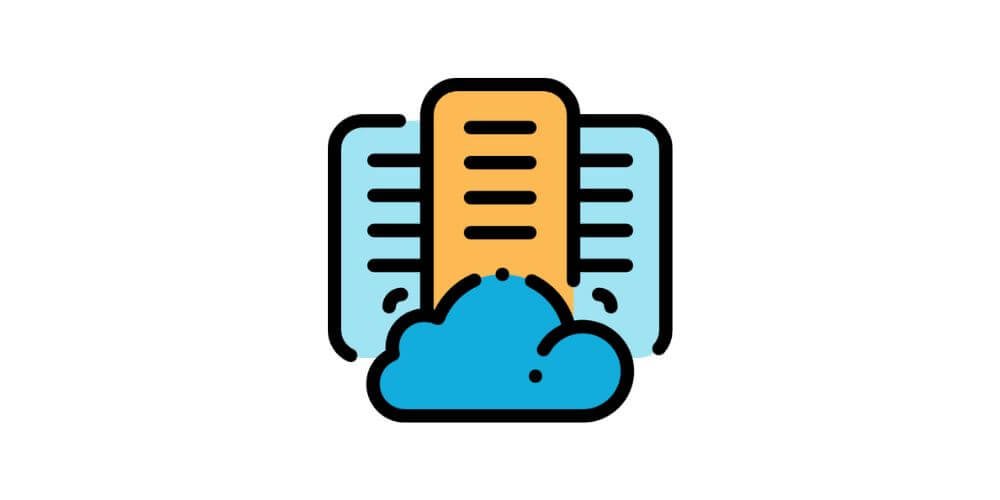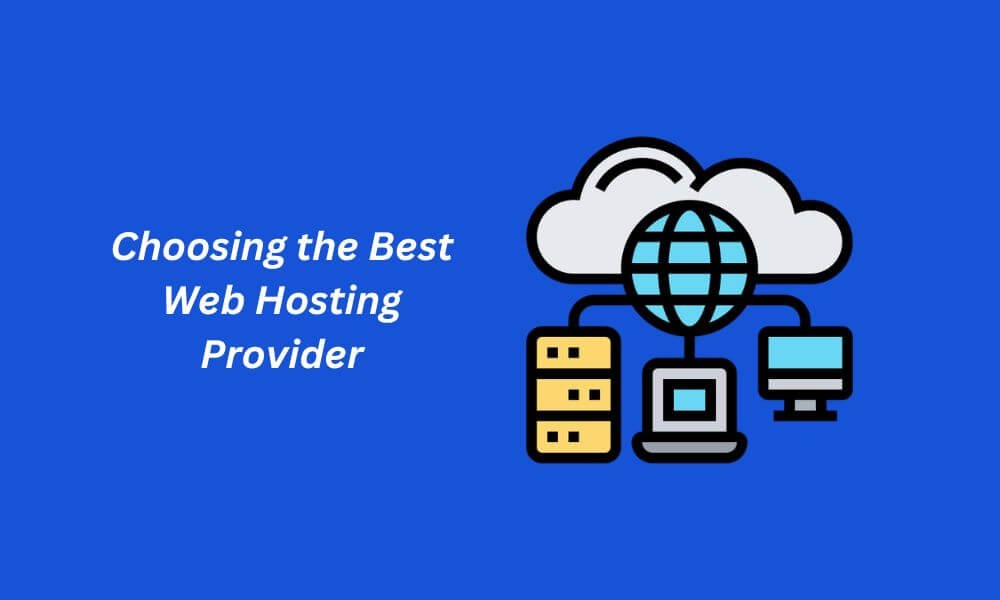If you’re looking for the factors to consider on how to choose the best web hosting provider for your blog, then this blog post is right for you.
Introduction
In today’s digital age, having a strong online presence is crucial, especially if you’re a blogger looking to reach a wider audience.
One of the key decisions you’ll need to make is selecting the right web hosting provider for your blog. The quality of your hosting service can significantly impact your website’s performance and user experience.
In this blog post, we’ll explore the ins and outs of how to choose the best web hosting provider for your blog, ensuring that your online journey starts off on the right foot.
What is Web Hosting?

Before delving into the nitty-gritty of choosing a web hosting provider, let’s clarify what web hosting actually is.
In simple terms, web hosting is a service that allows you to publish your website on the internet.
Think of it as renting space on a server where your website’s files and data are stored and made accessible to visitors.
Understanding Your Blog’s Needs
To select the perfect web hosting provider, you first need to understand your blog’s specific requirements.
Every blog is unique, and your hosting needs will depend on various factors, including:
- Traffic Volume: Consider how much traffic you anticipate. A high-traffic blog will require more robust hosting.
- Website Type: Are you running a simple blog or a multimedia-rich site with videos and images? Your content type affects your hosting needs.
- Budget: Hosting costs vary, so define your budget and look for providers within that range.
- Technical Expertise: Your comfort level with server management plays a role. Some hosts offer managed services, while others require more hands-on management.
Factors to Consider When Choosing a Web Hosting Provider
Now that you’ve assessed your blog’s needs, let’s dive into the essential factors to consider when selecting a web hosting provider:
1. Reliability and Uptime
When it comes to choosing the best web hosting provider for your blog, one of the foremost factors to consider is reliability and uptime.
Reliability refers to the hosting provider’s ability to deliver consistent and uninterrupted service. Uptime, on the other hand, signifies the duration your website remains operational and accessible to visitors.
A reliable host ensures that your blog is available to users 24/7, which is paramount for maintaining a positive user experience and preserving your blog’s credibility.
Look for hosting providers that offer uptime guarantees of 99.9% or higher, as this translates to minimal downtime and greater reliability.
A consistently accessible blog is more likely to attract and retain readers, ultimately contributing to the success of your online presence.
2. Speed and Performance
In the digital realm, where attention spans are fleeting, the speed and performance of your blog are non-negotiable. These factors significantly influence your blog’s success.
When selecting the best web hosting provider, prioritize speed and performance to ensure that your blog loads swiftly and functions seamlessly.
Fast-loading pages enhance user experience, keeping visitors engaged and reducing bounce rates.
Moreover, search engines favor speedy websites, which can boost your blog’s SEO rankings. To achieve this, opt for a hosting provider with fast server response times, efficient content delivery mechanisms, and robust infrastructure.
By investing in speed and performance, you’re not just retaining visitors; you’re setting the stage for your blog’s growth and success.
3. Scalability
Your blog may grow over time. Ensure your host can accommodate increased traffic and resource demands.
When choosing a web hosting provider for your blog, scalability is a pivotal consideration. Scalability refers to your hosting’s capacity to adapt and accommodate the changing needs of your blog as it grows. While your blog may start small, envision its potential for expansion.
Select a hosting provider that offers scalable solutions. This ensures that, as your blog gains popularity and experiences increased traffic, your hosting can effortlessly scale up to meet the heightened demand.
A hosting plan with scalability allows for seamless transitions, preventing downtime or performance issues during periods of growth.
By planning for scalability from the outset, you position your blog for long-term success and can confidently pursue its evolution without constraints.
4. Customer Support
When navigating the intricate world of web hosting, robust customer support can be your saving grace.
It’s not a matter of if, but when, technical issues or queries arise. This is where a hosting provider’s customer support steps into the spotlight.
Prioritize hosting companies known for responsive and knowledgeable customer support. The ability to reach out and receive timely assistance can make or break your online presence.
Before committing to a provider, test their support channels – live chat, email, or phone – to gauge their responsiveness and expertise.
A reliable support team can swiftly resolve issues, offering peace of mind and allowing you to focus on what matters most: creating content for your blog and engaging with your audience.
5. Security
In the digital landscape, security is paramount. When selecting the best web hosting provider for your blog, prioritizing robust security measures is non-negotiable.
Your blog contains not only your valuable content but also user data, making it a potential target for cyber threats.
Opt for a hosting provider that takes security seriously. Look for features such as firewalls, DDoS protection, regular security audits, and automatic backups.
A secure hosting environment shields your blog from malicious attacks, ensuring uninterrupted service and data integrity.
By safeguarding your blog and user data, you not only protect your reputation but also gain the trust of your audience.
Security is an investment that pays off in the form of peace of mind and a resilient online presence.
6. Price and Value
When embarking on your blogging journey, managing expenses is crucial, making the consideration of price and value in a web hosting provider equally significant.
While you may have a budget in mind, it’s essential to find a hosting solution that not only fits your financial constraints but also provides exceptional value.
Compare hosting packages from various providers, taking note of what each plan offers. Consider the long-term costs, as some providers may offer introductory rates that increase upon renewal. Look for providers that strike a balance between affordability and valuable features.
Ultimately, the goal is to maximize the benefits within your budgetary limits, ensuring that your hosting investment supports your blog’s growth and success without breaking the bank.
7. Hosting Type
Selecting the appropriate hosting type is pivotal when choosing a web hosting provider for your blog. Your choice should align with your specific needs and budgetary considerations.
- Shared Hosting: Ideal for beginners and cost-conscious bloggers, shared hosting involves sharing server resources with other websites. While budget-friendly, it may have limitations in terms of performance and scalability.
- VPS Hosting: Virtual Private Server (VPS) hosting offers more control and resources than shared hosting. It’s suitable for bloggers with moderate traffic and a need for flexibility.
- Dedicated Hosting: With a dedicated server, you have full control and resources at your disposal. This option suits high-traffic blogs with specific requirements but comes at a higher cost.
- Cloud Hosting: Cloud hosting is highly scalable, making it ideal for blogs with fluctuating traffic. You only pay for the resources you use, making it cost-effective.
Carefully assess your blog’s current needs and future growth potential to determine the hosting type that best suits your goals and resources.
Top Web Hosting Providers
Now that you know what to look for, here are some top web hosting providers that consistently receive positive reviews from bloggers:
- Bluehost: Known for its user-friendly interface and excellent customer support.
- SiteGround: Offers impressive speed and security features.
- HostGator: Provides budget-friendly options without compromising quality.
- WP Engine: Specializes in WordPress hosting with top-notch performance.
How to Choose the Best Web Hosting Provider

In this section, we’ll break down the process into clear steps to simplify your decision-making:
Step 1: Research
In the intricate world of web hosting, the first step towards choosing the perfect provider for your blog is research. Knowledge is your most potent tool in this endeavor.
Begin by gathering information about various hosting providers. Read reviews, delve into online forums, and seek recommendations from fellow bloggers.
Understanding the experiences of others can provide valuable insights into a hosting company’s reputation and performance.
As you research, pay attention to factors like uptime guarantees, customer feedback, pricing structures, and the range of services offered.
This information forms the bedrock upon which you’ll build your hosting decision, ensuring that you embark on your blogging journey well-informed and poised for success.
Step 2: Assess Your Needs
After thorough research in Step 1, it’s time to turn the spotlight inward and assess your blog’s unique requirements. Each blog is distinct, and your hosting choice should be a precise fit.
Consider critical elements like the anticipated volume of traffic, the type of content you’ll host (simple text or media-rich), and your budget.
Your technical expertise is also a factor; some hosting plans require more hands-on management than others.
By revisiting your blog’s specific needs and aligning them with the features offered by hosting providers, you can ensure that your hosting selection harmonizes seamlessly with your objectives.
This tailored approach lays the foundation for a successful and well-matched hosting experience for your blog.
Step 3: Budget Planning
In the realm of web hosting, understanding your financial parameters is crucial, making Step 3, budget planning, a pivotal stage in your decision-making process.
Determine your budget constraints clearly and honestly. Web hosting costs can vary significantly, and knowing your financial limits will help you narrow down your choices.
Keep in mind that while affordability is important, it should be balanced with your blog’s specific needs.
As you plan your budget, consider both short-term and long-term expenses. Some hosting providers offer introductory rates that may increase upon renewal.
By planning meticulously, you can ensure that your hosting investment aligns with your financial capacity, setting the stage for a sustainable and cost-effective hosting solution for your blog.
Step 4: Customer Support Test
In the intricate world of web hosting, technical glitches and inquiries are inevitable, making customer support test, a critical checkpoint in your hosting provider selection process.
Before committing to a hosting provider, take the opportunity to interact with their customer support channels.
Reach out through live chat, email, or phone with questions or scenarios. Assess their responsiveness, knowledge, and willingness to assist.
A reliable hosting provider should have a responsive and knowledgeable support team available 24/7 to troubleshoot issues and provide guidance.
A robust customer support system ensures that help is just a click away, offering peace of mind and minimizing disruptions to your blog’s performance.
This proactive approach ensures that your blog remains on solid ground, supported by a dependable hosting provider.
Step 5: Security Check
In an age marked by cybersecurity threats, conducting a security check is a vital component of your web hosting provider selection process.
Your blog’s integrity and user data are at stake, making robust security measures non-negotiable.
Choose a hosting provider that places a high priority on security. Look for features such as firewalls, DDoS protection, regular security audits, and automatic backups.
These elements form a protective shield around your blog, safeguarding it against potential attacks and data loss.
A secure hosting environment not only defends your blog’s reputation but also builds trust with your audience.
Security is an investment that ensures that your blog remains a safe and reliable online destination, free from vulnerabilities and disruptions.
Step 6: Scale for Growth
In the dynamic world of blogging, growth is often the ultimate goal, making scaling for growth, a strategic move in your hosting provider selection process.
When choosing a web hosting provider, consider your blog’s potential for expansion. As your content attracts more visitors, your hosting needs will evolve.
Opt for a hosting plan that offers scalability, ensuring that it can seamlessly accommodate increased traffic and resource demands.
By planning for growth from the outset, you minimize the risk of encountering hosting limitations down the road.
This forward-thinking approach sets the stage for your blog’s sustained success, enabling it to thrive and flourish as it gains popularity and influence in the digital landscape.
Final Thought
Choosing the right web hosting provider for your blog is a critical decision that can impact your website’s success.
By understanding your blog’s needs, researching hosting options, and considering key factors, you’ll be well-equipped to make an informed choice.
Remember to regularly assess your hosting as your blog grows to ensure it continues to meet your requirements.
Frequently Asked Questions
Q: What is the difference between shared and dedicated hosting?
A: Shared hosting means your website shares server resources with other sites. Dedicated hosting provides a server exclusively for your site, offering more power and control.
Q: Can I switch hosting providers later if needed?
A: Yes, most hosting providers offer migration services to help you switch smoothly.
Q: Do I need technical knowledge to manage my hosting?
A: Not necessarily. Many hosts offer user-friendly control panels, and some provide managed services, taking care of technical aspects for you.
Q: How can I improve website speed with my hosting provider?
A: Opt for a hosting plan with faster server response times and use content delivery networks (CDNs) to distribute your site’s content efficiently.
Q: Is free hosting a good option for my blog?
A: Free hosting often comes with limitations and ads. It’s better suited for personal projects. For a professional blog, consider paid hosting.
Q: What should I do if my website experiences downtime?
A: Contact your hosting provider’s support immediately. They should help resolve the issue promptly.




